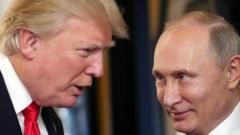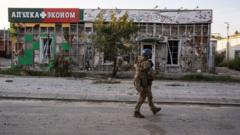At a recent news conference, Trump emphasized that he aims to compel Vladimir Putin to negotiate, though reactions in Ukraine suggest skepticism about mere rhetoric.
Trump Calls on Putin to End 'Absurd War' in Ukraine or Face Renewed Sanctions

Trump Calls on Putin to End 'Absurd War' in Ukraine or Face Renewed Sanctions
In a bold statement on Truth Social, Donald Trump warns of heavy tariffs on Russian goods if the war in Ukraine does not cease.
Donald Trump has issued a stark warning to Russian President Vladimir Putin, urging him to conclude what he described as the "absurd war" in Ukraine or face stringent sanctions. In a post shared on his social media platform, Truth Social, Trump indicated that he would impose substantial tariffs on Russian imports, reinforcing his belief that immediate negotiations are essential for the benefit of Russia and its economy.
Trump reiterated his earlier claims of being able to settle the conflict that erupted in February 2022 within a day, calling for a swift resolution. Despite Russia's silence regarding Trump's latest comments, there have been indications from senior officials in Moscow about a potential opportunity to engage with the new U.S. administration.
While Putin has expressed readiness to negotiate, he demanded that Ukraine recognize the territorial gains Russia has achieved—currently about 20% of Ukrainian land. Meanwhile, Ukraine has remained firm in its stance, insisting on the preservation of its territory. Trump, speaking at a news conference, hinted at imminent discussions with Putin, suggesting that if the Russian leader fails to engage productively, he is likely to impose more sanctions.
In a subsequent Truth Social post, Trump emphasized the urgency of settling the conflict, framing the potential sanctions in a manner he believes will pressure Russia to act. "Let’s get this war over with!" he wrote, highlighting the dire consequences of not reaching an agreement soon.
In Moscow, the Kremlin seeks clarity on what exactly Trump envisions in a peace deal before moving forward. At the same time, Ukrainian President Volodymyr Zelensky, addressing the World Economic Forum, asserted the necessity of at least 200,000 peacekeepers, specifically noting the importance of U.S. involvement in any future peacekeeping efforts to deter Russian aggression.
The response to Trump's words in Ukraine has been a mix of skepticism and hope, reflecting a cautious approach to further sanctions as a viable solution. Although Trump's history of engaging with world leaders suggests a potential for shifting dynamics, many Ukrainians remain skeptical about verbal commitments without concrete actions.
Amid this backdrop, reactions in Russia show some signs of internal conflict over the Kremlin's proposed terms for ending the war. With past notions of "victory" seeming increasingly unattainable, discussions around possible concessions are bubbling up, causing friction between hardline supporters and proponents of a more pragmatic approach.
As Trump continues to navigate his role in this ongoing crisis, many observers note the historical mistrust in peace negotiations with Russia, leading to an overarching sentiment in Ukraine that cautious skepticism is warranted—particularly after years of unsuccessful diplomatic measures.
Trump reiterated his earlier claims of being able to settle the conflict that erupted in February 2022 within a day, calling for a swift resolution. Despite Russia's silence regarding Trump's latest comments, there have been indications from senior officials in Moscow about a potential opportunity to engage with the new U.S. administration.
While Putin has expressed readiness to negotiate, he demanded that Ukraine recognize the territorial gains Russia has achieved—currently about 20% of Ukrainian land. Meanwhile, Ukraine has remained firm in its stance, insisting on the preservation of its territory. Trump, speaking at a news conference, hinted at imminent discussions with Putin, suggesting that if the Russian leader fails to engage productively, he is likely to impose more sanctions.
In a subsequent Truth Social post, Trump emphasized the urgency of settling the conflict, framing the potential sanctions in a manner he believes will pressure Russia to act. "Let’s get this war over with!" he wrote, highlighting the dire consequences of not reaching an agreement soon.
In Moscow, the Kremlin seeks clarity on what exactly Trump envisions in a peace deal before moving forward. At the same time, Ukrainian President Volodymyr Zelensky, addressing the World Economic Forum, asserted the necessity of at least 200,000 peacekeepers, specifically noting the importance of U.S. involvement in any future peacekeeping efforts to deter Russian aggression.
The response to Trump's words in Ukraine has been a mix of skepticism and hope, reflecting a cautious approach to further sanctions as a viable solution. Although Trump's history of engaging with world leaders suggests a potential for shifting dynamics, many Ukrainians remain skeptical about verbal commitments without concrete actions.
Amid this backdrop, reactions in Russia show some signs of internal conflict over the Kremlin's proposed terms for ending the war. With past notions of "victory" seeming increasingly unattainable, discussions around possible concessions are bubbling up, causing friction between hardline supporters and proponents of a more pragmatic approach.
As Trump continues to navigate his role in this ongoing crisis, many observers note the historical mistrust in peace negotiations with Russia, leading to an overarching sentiment in Ukraine that cautious skepticism is warranted—particularly after years of unsuccessful diplomatic measures.






















